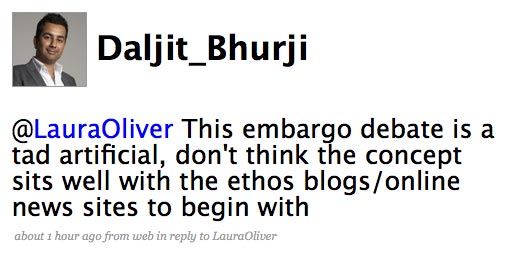Last week saw co-founder Katie Lee aka ‘ShinyKatie’ leave Shiny Media, a departure she announced on Twitter.

As TechCrunch reported, only one of the three original staff members is left, Chris Price. Shiny Media first launched in 2003, with its site TechDigest and then rapidly expanded and in 2007 received $4.5 million VC funding from Brightstation. By 2008 they had six main Shiny categories which split into different sites – 30 in total.
Things didn’t look so bleak for Lee in September last year when Lee discussed her plans for redesign with Journalism.co.uk. But even without Lee, Shiny is still going ahead with plans. This week saw the launch of TechDigest’s new look – with a ‘new user friendly format’, Chris Price told Journalism.co.uk.
Last Friday, was Lee’s last day as ShinyKatie. She spoke to Journalism.co.uk about Shiny and her plans for the future.
What is the situation for the company now? It seems the 30 blog titles are being maintained, but is this realistic?
[KL] “Many of the sites in our network are key to the deal we have with Glam, and they certainly won’t be closing. In terms of other sites, all I know is that traffic is Shiny Media’s biggest success story and Chris and his team will be working hard to make sure sites aren’t shut down unless they absolutely have to be.”
How do you feel about it? Did things get resolved amicably? Or will you be speaking out like [other co-founder] Ashley Norris?
“Obviously I’m absolutely gutted not to be working with such a talented, brilliant and (most importantly) funny editorial team. I have no plans on ‘speaking out because’ my team left behind in Shiny Media deserve to do well, deserve my respect and deserve the chance to continue doing their job without hindrance from me.
“It’s important to say that Ashley wasn’t in our office working full time for a very long time before that article was written. In fact, while he was working as a freelancer up until it was announced he’d left, we hadn’t seen in him in the office for months and as far as most of the staff were concerned, he hadn’t been a part of Shiny for some considerable time. I think the impression was that he’d been CEO up until it was announced he’d left, but that isn’t the case.”
It’s obviously sad to read about the plight an independent venture that seemed to be going so well: looking back can you see where some things went wrong?
“It’s still a successful network with some good advertising deals in place – such as the Vodafone Live Guy campaign we recently worked on, and a brilliant partnership with the Gadget Show Live.
“In terms of where we went wrong, we’ve certainly made some pretty big mistakes over the years, but with no model to follow over here, I think Shiny is still a pretty impressive success story. I wish we’d sorted out the commercial side of the business from the beginning rather than relying on advertising agencies to sell what are very bespoke advertising campaigns, but we finally have a sales team in house and they’re already making great strides forward.”
You’re still a shareholder – do you still have hope the company can turn things around?
“I certainly do still hope the company can turn things around, yes! I love Shiny Media, love the sites, and love the people that work there. It’s really important to me that the sites keep going. Shiny Shiny was my site that I started when I was 25, and the thought of it not existing anymore is something I can’t ever imagine. I know that Gemma feels the same about the fashion sites, especially Catwalk Queen. And if there was no TV Scoop I wouldn’t be able to geekout on Being Human reviews and the like!”
What are your plans now?
“I’ve got some ideas that have been bubbling away quietly in the back of my mind for some time now. I’m going to take a bit of time to work out which to focus on and where to take it and while I’m doing that I’ll keep myself ticking over with a bit of freelance consultancy and some journalism. I won’t be looking for venture capital funding – I’m more interested in starting small, keeping things simple and satisfying a few creative urges along the way. One idea in particular I’ve been dying to work on for a while now, so I’ve got plenty to think about!”
